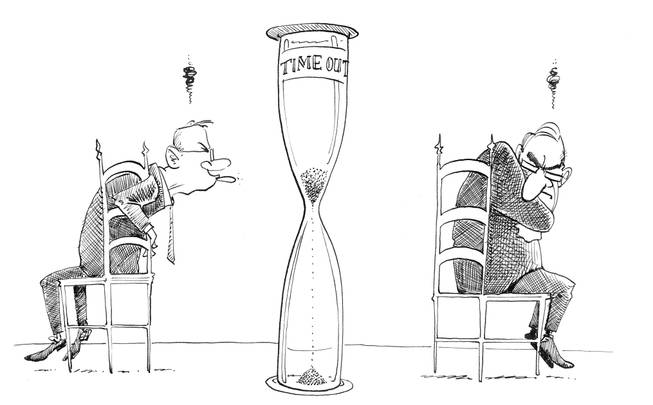Sunday, Nov. 29, 2009 | 2 a.m.
Sun Coverage
Sun Blogs
Watching from afar, it is easy to scoff at congressional recesses, or “district work periods,” as they are called — times when the House and Senate are not in session so lawmakers can attend to constituent needs at home.
Those lazy days when Congress is on break, built conveniently around holidays, from Presidents Day to July Fourth to Labor Day, seem just another perk for those who walk the halls of power.
The congressional calendar begins to resemble more and more the academic one: dither, cram, break.
But those watching closely notice the long nights when the lights remain on in the Capitol. The votes at dinnertime. The C-Span speeches running into the evening. The weekends, in the case of the recent health care debate, with Saturday sessions. The late visitors hustling in and out of House Speaker Nancy Pelosi’s office off the Capitol rotunda.
You see tempers flare, as they did recently on the Senate floor when Majority Leader Harry Reid said his Republican counterpart, Sen. Mitch McConnell of Kentucky, is someone “who is living in a different world from most everyone else.”
That outburst came on the same day McConnell cited veteran Washington Post columnist David Broder’s critique of the Reid health care bill as a “budget buster,” and Reid suggested that McConnell should ignore retired reporters. (Broder weighed in days later to say that he is very much still working, writing twice weekly, thank you.)
Sometimes, everyone just needs a time out.
Last week’s break brought a needed pause in Washington, and time for more celebratory pursuits. President Barack Obama pardoned a Thanksgiving turkey, self-effacingly noting that he had saved or created at least four or five (turkey) jobs. The first lady dazzled the town with Hollywood glamour and Washington diplomacy as hostess of the administration’s first state dinner.
Yet breaks last only so long and Washington will come back to life this week with much heavy lifting ahead.
Obama will deliver his long-awaited strategy for Afghanistan, the war that less than half of the country wants to continue fighting.
The House and Senate will resume session, turning attention to the bleak jobs front (the House) and the health care debate (the Senate).
Supporters of the health care bill still have high hopes that the Senate will finish its work by year’s end, and liberal groups are still stepping up pressure on Reid to make it so.
The progressive blog Firedoglake launched an online petition urging Reid to use the procedure called budget reconciliation to pass the bill in the Senate with a 51-vote majority, rather than the typical 60 votes.
Others have similarly suggested a temporary halt to the filibuster, the tactic that allows opponents to block a bill unless supporters can garner the 60 votes needed to advance it.
Reid hasn’t paid much attention to either, pledging to push forward with a robust debate. In fact, one conservative Democratic senator, Ben Nelson of Nebraska, explained in an op-ed piece that part of his decision to vote to open the debate came from his desire to participate in amending the bill rather than ceding its passage to a simple majority.
Still, patience with the Senate, the place where the Founding Fathers wanted legislation to go to cool, is not endless.
The days and nights ahead promise to be long and late. McConnell and Republicans have promised a “freewheeling” debate, with many amendments to the health care bill. Every step in the process can be drawn out with procedural plays that take precious time and test frayed tempers.
Those watching from afar may want to settle in for the show. Christmas may be four weeks away, but there is no recess scheduled yet on the congressional calendar. The break may not come until the work is done, and that’s a long way off.


Join the Discussion:
Check this out for a full explanation of our conversion to the LiveFyre commenting system and instructions on how to sign up for an account.
Full comments policy